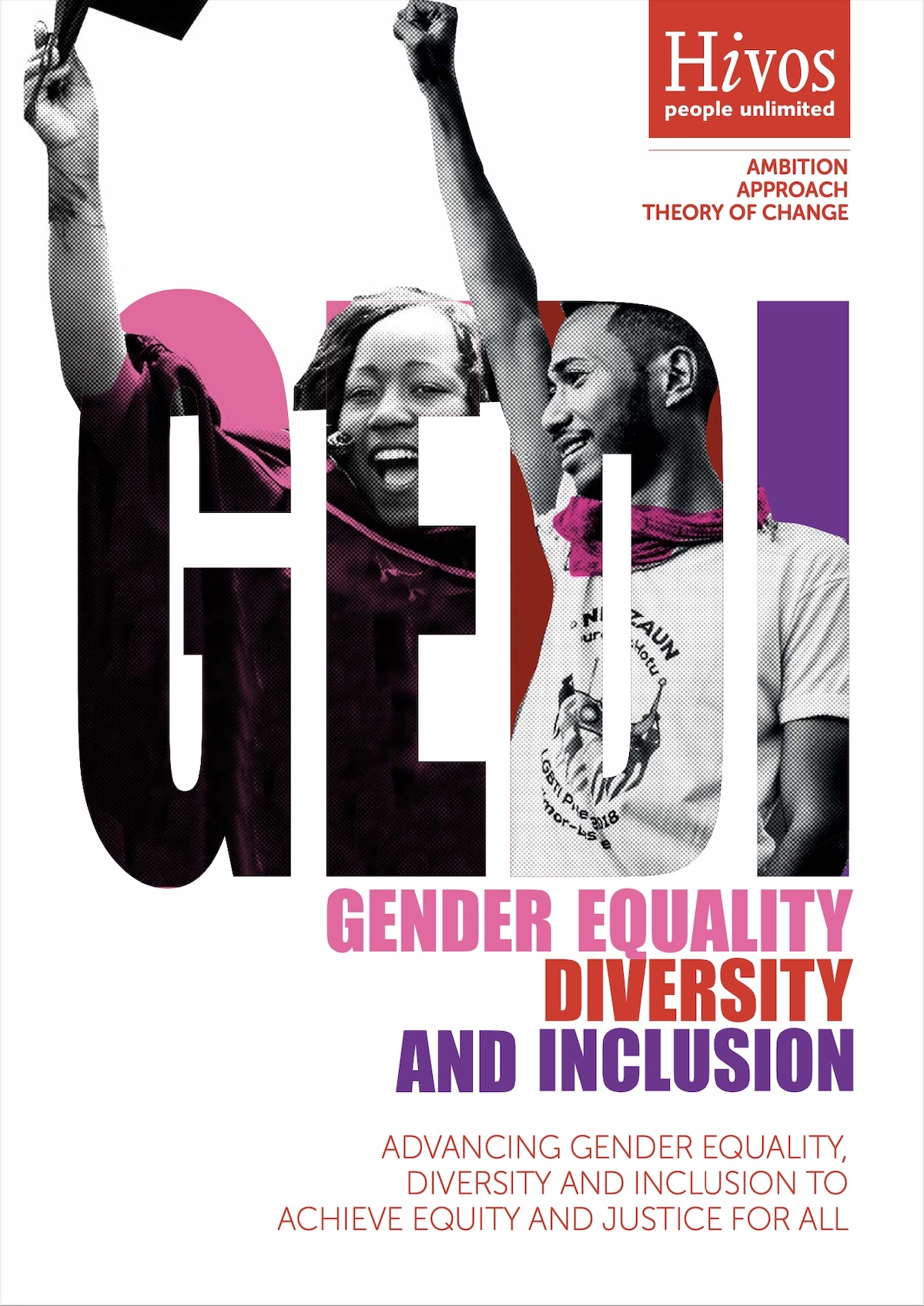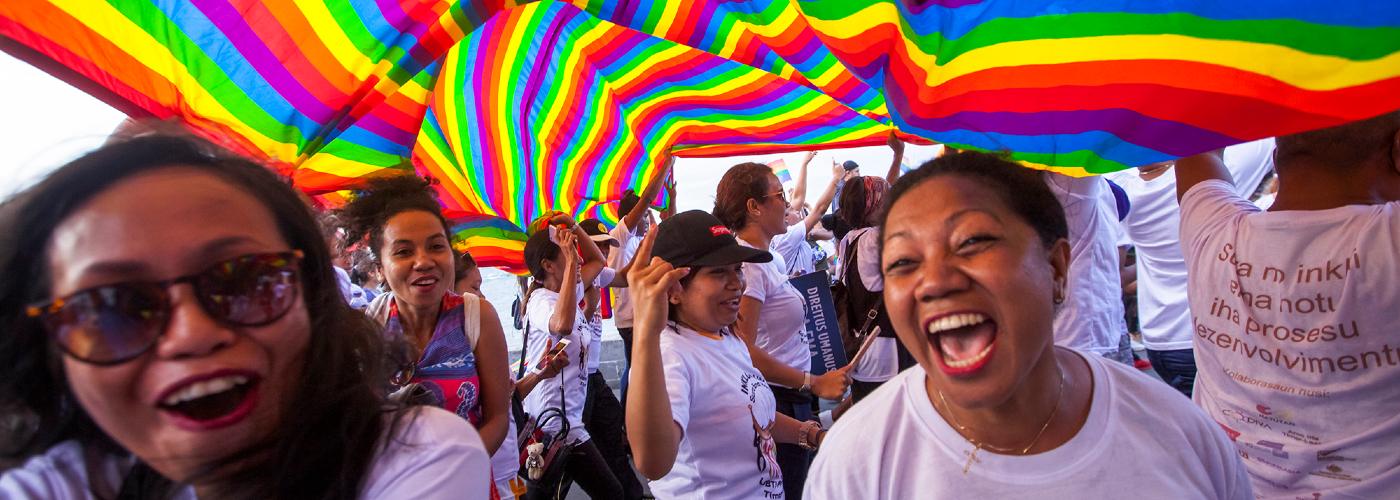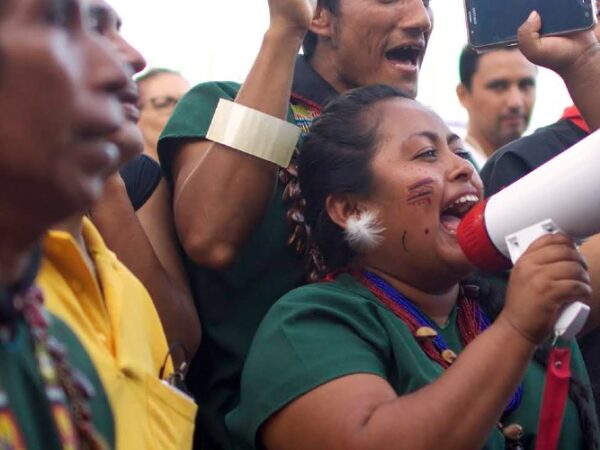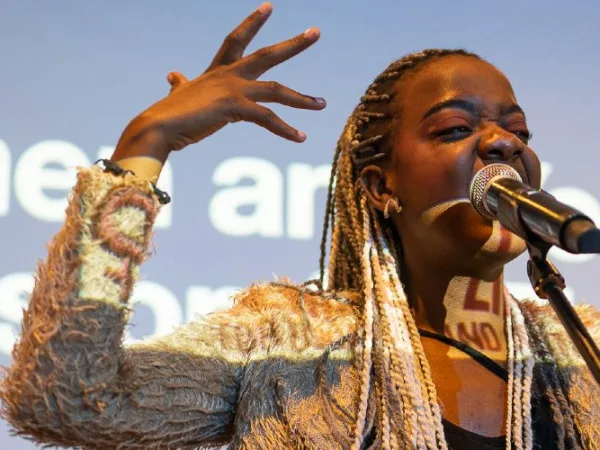Globally, we are witnessing increasing marginalization, shrinking civic space, the effects of climate change and the widening gap between rich and poor. It is evident that women, LGBTIQ+, and other marginalized communities are more likely to bear the social, health, and economic consequences. More so, widespread discrimination continues to impact the lives of women and people with diverse sexual orientations and gender identities. This interferes with their full enjoyment of all human rights and hampers their participation in processes that tackle the root causes of such discrimination.
To counter this, we want to co-create new solutions that catalyze broad social and structural transformation to advance gender equality, diversity, and inclusion (GEDI) and achieve equality for all. We aim to support rightsholders in their efforts to claim the power, agency, and leadership necessary to drive change.
Our vision:
A more just, fair, dignified, and prosperous society, where all people have equal rights, responsibilities, and opportunities. A world where gender equality, inclusive economies and governance practices become the principle for organizing and building just societies.
Our approach
Recognizing that there are multiple and intersecting forms of systemic discrimination, we put intersectionality at the center of our approach. Inclusivity in policy and practice is key to providing equal access to opportunities and resources for people who might otherwise be excluded.
Hivos acknowledges the power of people. We support rightsholders and their organizations in strengthening their personal and collective powers, claiming their rights and holding duty bearers to account. We recognize that GEDI transformative work is long term, often generational, requires sustained investments, and needs to be guided by rightsholders’ lived realities. Therefore, we have identified three thematic topics where Hivos can make a significant contribution based on its track record.
1. Access to inclusive sexual and reproductive health and rights (SRHR)
Strengthen women’s, girls, and LGBTIQ+ people access to inclusive sexual and reproductive health and rights (SRHR) by shifting norms and tackling barriers that hinder access to information and services, and ensure women, girls, and LGBTIQ+ people have control over their bodies and can freely and responsibly decide on matters related to their reproductive health and sexuality, free of coercion, discrimination, and violence.
2. Economic justice
Advocate for economic justice and rights of women and LGBTIQ+ people to secure economic resources, opportunities, services and wellbeing as well as influence and participate in economic decision-making. This entails improving women’s access to and control over resources and decent work and strengthening LGBTIQ+ communities’ ability to demand a fair share in economic development programs. Simultaneously, we will address endemic unemployment that disproportionately affect youth and LGBTIQ+ people and promote nondiscriminatory labor markets and decent work for all. Finally, we will use research to demonstrate the economic consequences of exclusion experienced by women and LGBTIQ+ people – even more so during the Covid-19 crisis and beyond in order to allow for meaningful engagement and address data gaps.
3. Advancing women’s, youth & LGBTIQ+ leadership and political participation
Advance women’s, youth & LGBTIQ+ leadership, and political participation at all levels of decision-making. To ensure greater voice, inclusion and representation of women, youth and LGBTIQ+ people in political and societal decision-making processes, we will facilitate opportunities to strengthen their leadership and organizational capacity by providing the resources and accompaniment necessary to lead and take their place at the decision-making table. We will also continue to support women’s full and effective representation and increased leadership positions in civic and political institutions and their participation in all levels of peace processes.
-
- We will continue to champion gender equality diversity and inclusion as a prerequisite to achieving more just, fair, dignified, and prosperous societies.
- We will practice intersectional feminism by always unpacking power and recognizing the impacts of different forms of systemic discrimination and that every person has multiple identity factors that impact their participation, their agency and who they are.
- We will promote human rights and dignity for all free from harm, violence, and exploitation. Until we are all free, none of us is free.
- We will ensure that our partnerships and programmatic work are grounded on the principle of self-determination - where bodily integrity and autonomy, voice, choice, and agency are prerequisites to the right to decide and for enabling resilient rightsholder movements and societies.
- We recognize that trust, mutual accountability, and sharing power are critical drivers for us to deliver our mission without perpetuating further marginalization, racism, or discrimination against those that we are called to serve. Hivos will continue to boost local ownership in our programs, within our organization, and among donors and the development sector.
- We will engage in ongoing critical (self) reflection to ensure that GEDI principles are adequately reflected in our programs, staff, and management. We will therefore strive to create a diverse and inclusive working environment that is reflective of the communities we serve and continuously address structural inequalities and discrimination in our partnerships and workplace.
- We commit to zero tolerance to discrimination and will call out any forms of discrimination and abuse of power in our workplace and in our partnerships. As an institution, we commit to support those who speak-out and encourage ongoing dialogues centered on the values of do no harm including accountability and transparency in our safeguarding practices.
Key Gender Equality, Diversity and Inclusion programs
Hivos has a longstanding track record on supporting rights holders, activists and organizations that advance LGBTIQ+ rights and inclusion, SRHR, and women’s empowerment. This has earned us global recognition as a pioneer in the field of LGBTIQ+ advocacy. Inspiring examples amongst our programs are:
- Free to be Me is an innovative program that builds and maintains a movement of self-confident and diverse LGBTIQ+ organizations and activists who advocate for their human and socio-economic rights.
- We Lead aims to strengthen the influence and position of young women whose sexual and reproductive health and rights (SRHR) are neglected the most.
- Voice connects and amplifies the voices of the most marginalized and discriminated people in 10 countries through innovative grant making and inclusive linking and learning. Voice uses very context-specific influencing tools, methods and approaches, leading to impressive results: almost all rights holder groups have increased their ability to influence social actors.
- The Sexual Reproductive Health and Rights (SRHR) Fund aims to improve all citizens’ rights and access to quality SRHR services – particularly of women, girls, key populations and marginalized groups – in a safe, fair and equitable manner. The Regional SRHR Fund has adopted an approach that is interconnected and mutually reinforcing. Evidence-informed grantmaking processes are at the core of the Fund’s activities.
- She Leads promotes women and girls’ full and effective participation and leadership in political and societal decision-making in Zimbabwe.
- Alianza Liderazgo en Positivo (HIV Positive Leadership) and Poblaciones Clave (Key Populations) aim to strengthen the advocacy work of social organizations and communities considered key populations to improve their quality of life and achieve full human rights for all key people living with HIV in Latin America. This innovative effort combines the leadership, vision, capacities, and strengths of different regional networks of people living with HIV and key populations.
Find a full overview of all our GEDI programs here.

Key terminologies
-
Our understanding and practice of gender equality is based on all people’s equal rights, responsibilities, and opportunities regardless of age, gender, sexual orientation or gender identity, ethnicity, ability, religion, age, among other grounds.
-
We use the term diversity when discussing equal rights and opportunities because people (rightsholders) differ. It refers to the practice and quality of including or involving people/rightsholders from different social, political, and ethnic backgrounds and of different genders, sexual orientations, social-economic class, amongst other determinants.
-
The term inclusion describes our active, intentional, and ongoing engagement with diversity as described above. And the degree to which we meaningfully engage with people who might otherwise be excluded or marginalized, ensuring they have equal access and resources to participate fully in society.
-
We use the term rightsholders to highlight the power of women, girls and LGBTIQ+ people, rather than focus on their marginalization through other common terminologies.
-
We use the acronym LGBTIQ+ to refer to lesbian, gay, bisexual, trans, intersex and queer people; the ‘+’ indicates that these terms have a limited scope, and not all people who are marginalized because of their sexual orientation, gender identity or expression, or sex characteristics (SOGIESC) self-identify with these terms.
-
We use the term women as an inclusive category to include cis-gender, transgender and intersex women and women of all ages, including girls.
-
Intersectionality is an analytical framework for understanding how aspects of a person’s social and political identities combine to create different modes of discrimination and privilege, as expressed by Kimberlé Crenshaw (1989). The idea is that when it comes to thinking about how inequalities persist, categories like gender, race, and class are best understood as overlapping and mutually constitutive rather than isolated and distinct.
Gender Equality, Diversity and Inclusion within Hivos
Hivos applies a GEDI lens to all its programs. Some examples are ENERGIA’s work with women entrepreneurs in the renewable energy sector, and the support to LGBTIQ+ defenders by our Digital Defenders Partnership. We set minimum GEDI objectives, targets and strategies for all programs, and include at least one GEDI outcome focused on observable changes in behavior, practice and performance. When doing lobby and advocacy work, we ask other stakeholders and those in power to also apply that lens.
We walk the talk by ensuring that our organizational culture and partnerships align with our GEDI vision. From the highest governance body to project level and our partners, we are committed to anchoring gender equality, diversity and inclusion in our own organization and in the way we involve communities and other stakeholders. Hivos’ GEDI Strategy leads this process, and we hold ourselves accountable and report on our progress.
If you have questions or suggestions, you can reach out to Lucy Mung’ala, Hivos’ Gender Equality, Diversity and Inclusion Impact Lead.


